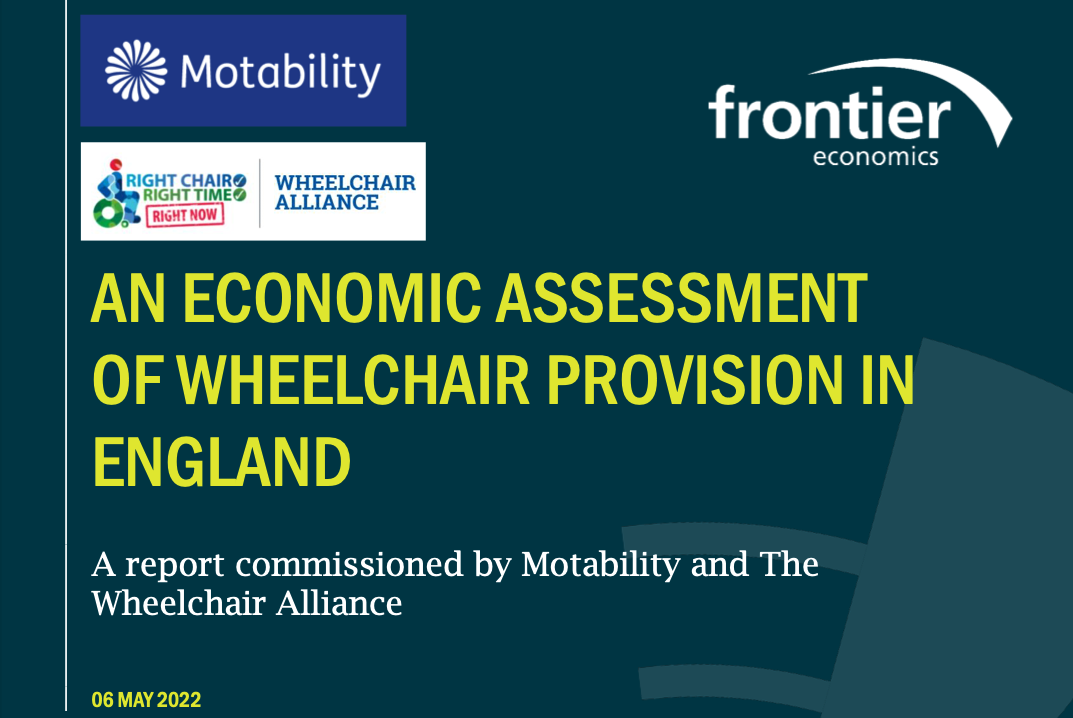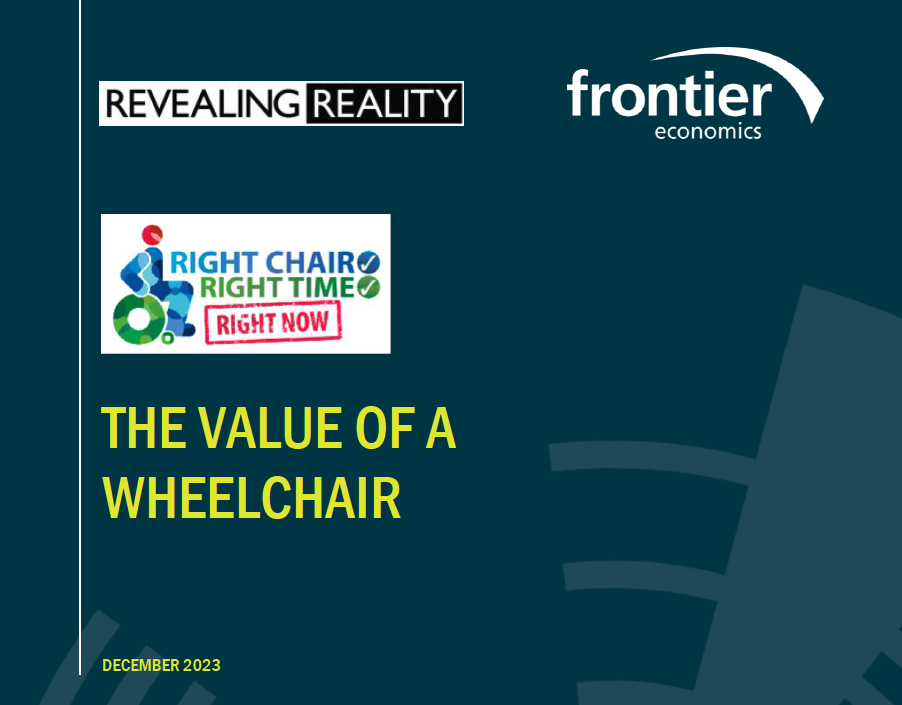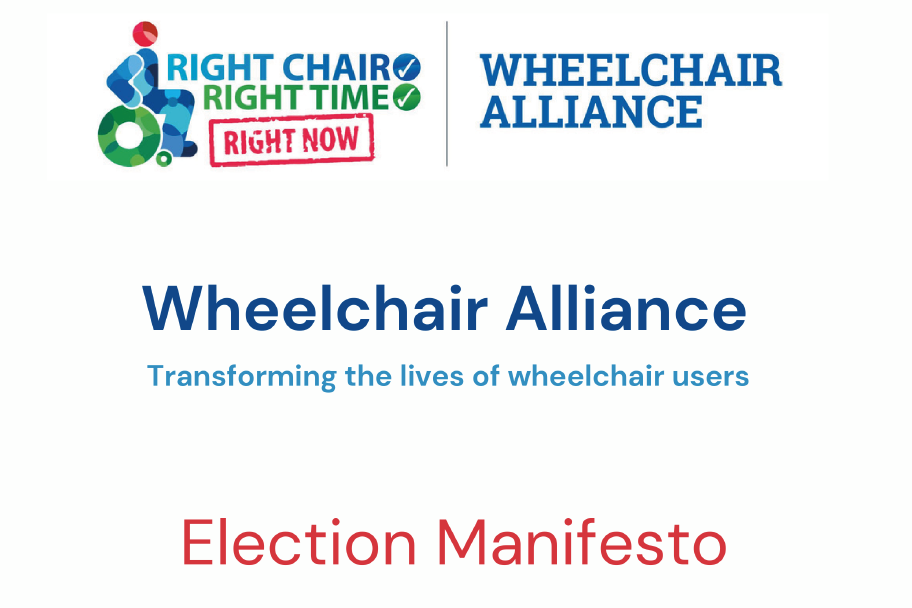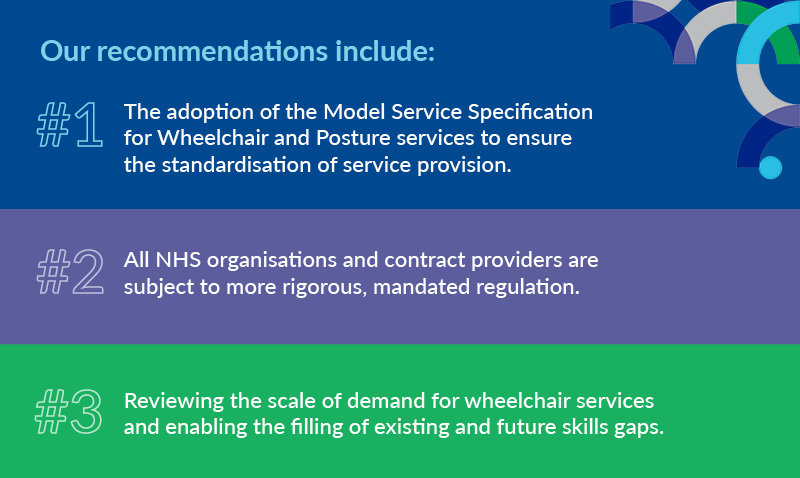The Power of our Reports to Influence Change
Welcome to the Reports page of the Wheelchair Alliance website. Our research and subsequent reports demonstrate and quantify the issues faced by wheelchair users, as well as wheelchair service providers and commissioners.
They are compiled by market leading, independent research companies and funded through grants from The Motability Foundation to give a true picture of the state of wheelchair provision in England.
We hope that, through our extensive research efforts and publishing of our findings, we will create positive change and innovation for wheelchair users.
Research Rationale
Our research is driven by a steadfast commitment to understanding and addressing the needs and challenges faced by wheelchair users. We recognise that comprehensive, data-driven insights are crucial for developing effective solutions that can significantly enhance the quality of life and independence for individuals who rely on wheelchairs.
Why We Conduct Research
At the Wheelchair Alliance, we believe that knowledge is a powerful enabler of change. By systematically studying various aspects of wheelchair use, accessibility and technology, we can identify gaps, highlight opportunities, and inform policy decisions. Our goal is to empower stakeholders, including wheelchair manufacturers, healthcare providers and policymakers with the information they need to make impactful, evidence-based decisions.
What We Research
Our research covers a broad spectrum of topics, including but not limited to:
- Advances in wheelchair technology and design
- Accessibility and inclusivity in public and private spaces
- Health and wellness of wheelchair users
- Socioeconomic impacts of wheelchair use
- Policy and regulatory frameworks affecting wheelchair accessibility
How We Conduct Research
We employ a rigorous, multidisciplinary approach to our research, utilising both qualitative and quantitative methods. This includes surveys, case studies and collaborative projects with leading health and social care organisations, academic institutions, industry experts and advocacy groups. We employ the services of acclaimed independent research companies with years of experience in the health and social care research field. Our research is also grant funded, which means we have to follow strict policies with regards to our methodology and how we share our results.
Creating Change Through Research
The insights gained from our research efforts are not just academic exercises; they are powerful tools for advocacy and action. By disseminating our findings through detailed reports, we aim to inspire and drive meaningful change within the community and beyond. Our research has already contributed to several significant advancements and policy shifts, underscoring the transformative potential of well-informed advocacy.
A Legacy of Excellence
We are proud to build on a foundation of excellent reports that have been published in the past. These reports have set high standards and have been instrumental in shaping the discourse around wheelchair use and accessibility. As we continue to expand our research endeavours, we remain committed to maintaining and surpassing these standards, ensuring that our work continues to make a real difference.
Explore our reports to stay informed about the latest developments and join us in our mission to create a more accessible and inclusive world. The 2022 report highlights the state of the nation, the 2023 report explains the value of the right wheelchair and our 2024 report will demonstrate how actual change can be delivered.
2022 Wheelchair Research Report - An Economic Assessment of Wheelchair Provision in England

The Wheelchair Alliance has partnered on the publication of a vital report calling for more to be done to enhance the lives of wheelchair users, their families and carers.
‘An Economic Assessment of Wheelchair Provision in England’ is the first time independently verified research has been published revealing the experiences of wheelchair users. The findings make a series of recommendations on how more work, resources and investment are all required to meet the needs of this often under-represented section of society.'
2023 Wheelchair Research Report - The Value of a Wheelchair

The Wheelchair Alliance commissioned a research report to identify the real value of providing the right wheelchair that truly meets the needs of the user to enable them to live the life they choose.
This report uses a social return on investment methodology however, the Alliance is aware that:”Wheelchair users aren’t economic units, and it is not about what a wheelchair user can provide to the economy – it should be about the individual first and foremost.”
SM, November 2023
Wheelchair Alliance Election Manifesto

The Wheelchair Alliance launched its manifesto on 28th June ahead of the general election. It champions the needs of wheelchair users across England and calls for the new Government to deliver lasting change for the better when it comes to wheelchair provision. You can read more on the 5-point plan for immediate action by downloading the Manifesto by clicking on the button below.
2022 Wheelchair Research Report
The Wheelchair Alliance has partnered on the publication of a vital report calling for more to be done to enhance the lives of wheelchair users, their families and carers.
‘An Economic Assessment of Wheelchair Provision in England’ is the first time independently verified research has been published revealing the experiences of wheelchair users. The findings make a series of recommendations on how more work, resources and investment are all required to meet the needs of this often under-represented section of society.'
Who is behind the research
The report was undertaken by Frontier Economics and commissioned by the charity Motability in partnership with the Wheelchair Alliance.
The Alliance has considered the findings and agreed, in partnership with its Wheelchair User Engagement Group, the key priorities to be addressed. This position statement explains the priorities and appropriate actions.
Download the full report
Findings
Wheelchair services in England are not working
Funding levels are unacceptable
The report indicates that Government funds spent on wheelchair users equates to an average of £125 per person per year, including the cost of a wheelchair, expert support as well as infrastructure costs. This level of underfunding has remained the same for at least five years. If the costs of energy, equipment and staffing are all rising, this figure needs urgent review for wheelchair support to be protected.
Accurate wheelchair user data does not exist
It is only by understanding the true demand for wheelchairs and providers that NHS England can commission appropriate services. Adequate funding requires accurate wheelchair user data so their families and carers can be confident that they will be treated equitably wherever they live in England. This means all types of wheelchair services must offer regular data based on outcomes to ensure accountability and reduce regional differences.

Our recommendations include:
#1 The adoption of the Model Service Specification for Wheelchair and Posture services to ensure the standardisation of service provision.
NHS England has worked in partnership to develop a service specification for wheelchair services. This is an effective guideline but as its non-compulsory, there are significant variations in structure and delivery between areas of England. This level of inequity must be addressed as the standardisation of provision is vital.
According to the report, wheelchair users are categorised into three levels of assessment/intervention criteria; low, medium and high. There is significant confusion over how these categories are interpreted, with some wheelchair users feeling there could be some discrimination. Ultimately, commissioners should be better educated about wheelchair users in their region and ensure individual needs are considered holistically.
In addition, providers currently interpret the specification to their local community or available budget and this sometimes leads to inconsistencies in provision. A more nuanced and tailored approach is required.
The Wheelchair Alliance will:
- work collaboratively with NHS England and the National Wheelchair Advisory Group to develop the Model Service Specification to ensure it becomes more than guiding principles.
- lobby at the highest level, possibly through the development of an All Party Parliamentary Group for Wheelchairs and Postural Management, to ensure wheelchair services have a full understanding of what they need to provide.
#2 All NHS organisations and contract providers are subject to more rigorous, mandated regulation.
NHS England has worked hard to develop a reporting dataset for wheelchair services. However, this is often inconsistent meaning gaps in service provision are hidden. It is essential that the data includes outsourced providers to ensure that a full picture of service provision is available each quarter. The Wheelchair Alliance believes a more rigorous approach to standards is essential with the need for an independent regulator.
The report raises concerns that wheelchair users may be being exploited due to a lack of clear regulation, independent review body or information about who to approach regarding repairs, complaints or suggestions for service improvements.
The Wheelchair Alliance will:
- work with NHS England and providers to develop a simple system for wheelchair users, their families and carers to help them get repairs, feedback and make suggestions on service improvements. These issues should be led by wheelchair users themselves through wheelchair user groups linked to each service.
- discuss the possibility of a regulatory body with oversight for all wheelchair and postural management services, or lobby for a National Institute of Health and Care Excellence (NICE) guideline for wheelchair and postural management.
#3 Reviewing the scale of demand for wheelchair services and enabling the filling of existing and future skills gaps.
It is impossible for NHS England and service commissioners to provide appropriate delivery funding without knowing the scale of demand. Unfortunately, this has been approximated for many years, and is an issue that should be urgently resolved.
When real demand is known, then appropriate funding can be identified for all aspects of wheelchair services ranging from the recruitment of skilled clinicians to the purchase of high-quality equipment. The report indicates significant uncertainty surrounding the number of wheelchair users in England. Understanding demand facilitates the robust planning of services where the appropriate number of highly skilled staff such as therapists, rehabilitation engineers and technicians can be forecast correctly.
The report highlights the importance of a highly skilled workforce. A community of practice to support the professional development of individuals and raise the profile of roles at education establishments is needed.
The Wheelchair Alliance will:
- seek to meet with NHS England every quarter to discuss the minimum data set commissioners complete to drive service improvement and address recurrent issues behind poor provision.
- aim to develop an online resource hub in collaboration with key organisations where professionals can access and share examples of good practice.
Download the full report
2023 Wheelchair Research Report
Introduction
The Wheelchair Alliance (the Alliance) commissioned a research report to identify the real value of providing the right wheelchair that truly meets the needs of the user to enable them to live the life they choose. The Value of a Wheelchair research was undertaken by two independent research organisations, Frontier Economics and Revealing Reality. It was grant funded by the Motability Foundation and published in December 2023.
The report follows on from the Wheelchair Alliance’s first report which was published in October 2022. This ‘state of the nation’ piece of research highlighted three key areas of concern:
- that wheelchair services in England do not consistently work for service users,
- that NHS provided wheelchair services should be subjected to more rigorous and mandated regulation and
- that the true scale of demand is not known.
A position statement and priority actions were developed to address these challenges with action still needed to be taken to ensure equitable provision across England.
The Value of a Wheelchair report considered both quantitative data and in-depth interviews with wheelchair users across England. It unambiguously shows that the provision of a high quality wheelchair does not only have a significant beneficial impact on people’s lives but also leads to financial benefits for the NHS and society. It highlights that, using conservative assumptions, investment in wheelchair services could result in significant positive economic impact at a ratio of approximately £3 benefit across society for every £1 invested. The report stated that an annual increase of £22million pounds across wheelchair services, with wheelchairs users provided with the right high quality wheelchair realising a conservative annual total of 1% benefit, would result in a societal return of excess of £60 million. Should the annual total benefit be 5%, the same investment would realise benefits to society, including savings to the NHS, of in excess of £315 million pounds.
This report uses a social return on investment methodology however, the Alliance is aware that:
‘‘wheelchair users aren’t economic units, and it is not about what a wheelchair user can provide to the economy – it should be about the individual first and foremost”
SM, November 2023
and the Alliance agrees that a follow up report considering the wheelchair users voice, the human impact of the right wheelchair should be the next step.
Download the full report
Findings
The report highlights three key issues:
Local variation: there are clear advantages to locally led provision of NHS wheelchair services. In particular commissioners can provide a service which is tailored to local needs. However, this has led to variation in the standard of care provided and service user experience. This variation has been highlighted in previous studies and our in-depth engagement with wheelchair users reemphasises this inequality. Service users reported that they were often left to navigate the system themselves and had to rely on their own experience and knowledge to access support.
Funding: analysis shows that a relatively modest increase in wheelchair service equipment spend could make a meaningful impact on the budgets of Integrated Care Boards (ICBs) who are currently reporting below average per patient spend on equipment budgets. This increase in spend would deliver significant cost benefits.
Integration of service budgets: there is a need to ensure that current budgets are used in the most effective way possible. This includes the sharing of best practice between commissioners and realising the advantages of joined up working and pooled budgets by statutory bodies for the benefit of wheelchair users, their families and carers.
Wheelchair Alliance Actions
The Value of a Wheelchair report highlights three policy changes that would enable a significant difference to be made. Under each policy area, the Alliance has indicated the action it will take.
Policy Recommendation #1
NHS England to play a more active role in ensuring that all ICBs prioritise wheelchair services and dedicate sufficient resources to effectively deliver the service. For example, this could be done by mandating that all ICBs adopt the Quality Framework for Wheelchair Provision along with the Model Service Specification when commissioning wheelchair services. This would help to minimise inequality across different services and ensure consistent delivery of a good quality service and provision.
Action One:
We will ensure the voices of wheelchair users are represented during the development of the Quality Framework for Wheelchair Provision.
Action Two:
We will act as a co-producer of the Quality Framework, only signing off the content when it is approved by both the Alliance Board and its Wheelchair User Engagement Group members.
Action Three:
We will lobby the Chief Executive of the NHS to raise awareness and importance of the Quality Framework and expect urgent delivery of an early sign off.
Action Four:
We will ensure the Alliance Wheelchair Charter reflects the expectations of the Quality Framework and provide a wheelchair user friendly guide to the Quality Framework.
Action Five:
We will enable commissioners to provide the best wheelchair services by ensuring the Model Service Specification for Wheelchair and Specialist Seating is brought up to date and ratified.
Policy Recommendation #2
The Department of Health and Social Care (DHSC) and NHS England should explore the possibility of increasing current spending on NHS wheelchair services to help ensure more benefits are realised and the NHS can unlock significant cost savings.
Action Six:
We will lobby at Governmental level, demanding a review of current investment levels into wheelchair services which have not altered in decades and have been severely impacted by both austerity measures and the cost-of-living challenges.
Action Seven:
We will work in collaboration with NHS England, ICBs, other statutory bodies, charitable organisations, manufacturers, providers and wheelchair users to demonstrate the benefits of providing high quality wheelchair services and a choice of wheelchairs to suit a persons identified lifestyle needs. This will be through our APPG for Wheelchair Provision and via an innovation group.
Policy Recommendation #3
Local wheelchair services and commissioners should continue to share best practice and explore opportunities to pool budgets between wheelchair services and other local services. NHS England should consider what support and processes are required to encourage and facilitate greater joined up working and frictionless pooling of budgets.
Action Eight:
We will promote best practice examples through case studies published in our newsletter and on our website.
Action Nine:
We will identify funding opportunities to conduct research to demonstrate the human benefits of shared funding mechanisms as identified by wheelchair users, their families and carers.
Action Ten:
We will continue to monitor the provision of wheelchairs and, should there continue to be inequity of provision and choice across England, have high level discussions exploring the benefits of a national wheelchair service provision funded through health, social care and education contribution.



